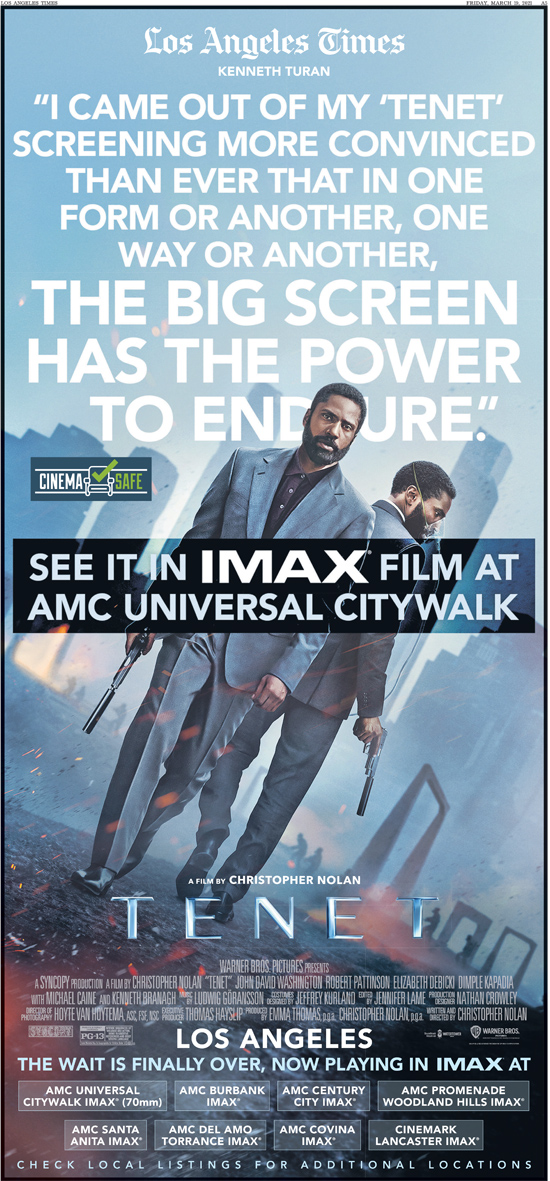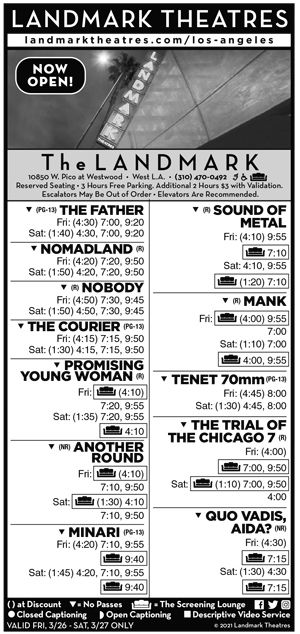"Tenet" Reviewed in 70mm IMAX |
Read more at in70mm.com The 70mm Newsletter |
| Written by: Tyler Purcell, Los Angeles, USA | Date: 29.03.2021 |
 After
a year of COVID 19 lockdown, and closed cinemas, "Tenet" finally played in
70mm IMAX for two weeks late in March 2021 at the AMC Universal CityWalk
IMAX, in Los Angeles, USA. After
a year of COVID 19 lockdown, and closed cinemas, "Tenet" finally played in
70mm IMAX for two weeks late in March 2021 at the AMC Universal CityWalk
IMAX, in Los Angeles, USA.
I’ve been eagerly awaiting
"Tenet" for quite
sometime. As a huge fan of large format filmmaking, it’s always great to see it
being used for “normal” movies. Christopher Nolan and cinematographer Hoyte Van
Hoytema have been a great team so far, but they haven’t yet made a more “normal”
movie until "Tenet". The trailers were very enticing as well, with a great cast
and very interesting plot line revolving around inverse time. The boxes were
checked and I couldn’t wait to see the movie at our local 15 perf
IMAX theater
and probably Cinerama Dome on 5 perf 70mm as well. However, the global pandemic
prevented a wide release of the movie at its scheduled dates. With that said
however, I was able to see a special screening of the 5 perf print and recently
(finally) the 15 perf IMAX print. I’ve also seen the film twice at home on UHD
BluRay, in stellar 10 bit full HDR 4:4:4 quality. |
More in 70mm reading: "Tenet" Production Info "Tenet" in the splendour of 7OMM in70mm.com's IMAX Page The Hateful Eight is a Wonderful Cinematic Experience for the true Cinefile Panavision and the Resurrecting of Dinosaur Technology Nolan's "Dunkirk" will feature over 100 minutes of IMAX material Magellan 65 Presented in Hollywood |
 They also did a photochemical color, which would be from the negative to the IP.
Due to Nolan insisting on a photochemical finish, IMAX had to develop a camera
that shot backwards. This may sound easy, but it’s really not as most film
cameras are really only made to run one direction. So they needed to develop a
special magazine that had the supply reel load the film. This was the ‘reverse’
magazine and they only had a few and according to my friend, they always had
issues. If you look at BTS footage, you always see pictures of stacks of mags
lying around on set. They also had an HD tap on the cameras, with Blackmagic
Design playback units, so they could play back the footage in reverse to insure
it came out well. The IMAX cameras presented other challenges of course, like
doing hand held scenes in reverse and having a tethered camera (for power),
something Hoyte had to deal with on a shot by shot basis. They also did a photochemical color, which would be from the negative to the IP.
Due to Nolan insisting on a photochemical finish, IMAX had to develop a camera
that shot backwards. This may sound easy, but it’s really not as most film
cameras are really only made to run one direction. So they needed to develop a
special magazine that had the supply reel load the film. This was the ‘reverse’
magazine and they only had a few and according to my friend, they always had
issues. If you look at BTS footage, you always see pictures of stacks of mags
lying around on set. They also had an HD tap on the cameras, with Blackmagic
Design playback units, so they could play back the footage in reverse to insure
it came out well. The IMAX cameras presented other challenges of course, like
doing hand held scenes in reverse and having a tethered camera (for power),
something Hoyte had to deal with on a shot by shot basis. I have to say for the record, the team did an outstanding job technically. Hoyte knocked it out of the ballpark and rightly so, his cinematography has improved dramatically since he started working with Nolan. Hoyte’s work in "Dunkirk" was fantastic but with "Tenet", he’s made it even better. Basic dialog scenes are perfectly lit, to the point where you never know the source of the light. Hoyte is the master of hiding lights in plain sight and with darker skinned cast members (which is always more tricky) he’s done a brilliant job. I have to say it’s one of the best looking movies I’ve seen in years. Not a single mistake cinematography wise in the entire movie. I will say tho, the movie did feel much better (like "Dunkirk") on the 5 perf 2.20:1 prints, rather than the 1.44:1 prints. The framing was just not ideal in the IMAX setting, people were too large for the screen, it felt unrealistic. Had they used wider lenses, it may have worked better, but to get the angles they wanted, the smaller standard movie screen worked a lot better. Even though the IMAX experience was outstanding, with practically a standing ovation thanks to the amazing print and projection system, I still preferred the smaller screen. It wasn’t as nauseating and because the film’s pace is so fast, you don’t have time to look around the HUGE IMAX screen to see things going on. The added size meant nothing either, there was nothing out of the 5 perf frame that had any relevance. The only thing about the 15 perf footage was how crisp it was. When I mean crisp, I mean it was so crisp, I could see signs in the distance that looked like they were a mile away or so. Yet, it wasn’t disturbing like high-resolution digital because film itself adds a layer which helps hide those things. The 5 perf material on the 15 perf prints, was absolutely recorded out digitally. It was much softer than the 15 perf material and unlike "Dunkirk" which had dirt and higher grain, this time the 5 perf material in the 15 perf prints was clean. So clearly they recorded out the 5 perf material onto 15 perf IN stock and then cut it into the 15 perf string because its impossible those 15 perf scenes were recorded out, no way. Both the 5 perf and 15 perf prints had deep rich blacks, they had no grading issues at all. Tho I will say, both presentations weren’t very bright. I don’t know why that is, maybe they made a higher density print for a reason? Not sure, but holy crap does this movie look good on film. Shut off the digital projectors, I’m sold. Sadly, neither theater I saw the film at, had film trailers. The 5 perf presentation, the old Century JJ projector (part of "The Hateful Eight" fleet) started up after the digital trailers and chugged away at the print, making a lot of noise in the theater, which was comforting. The 15 perf IMAX presentation was at an AMC, with some digital trailers that made me want to puke in both content and quality of digital projection. When the film projector popped on, I was so happy to see the absolutely jaw dropping high resolution 15 perf image. How can anyone think digital projection can hold a candle to 15 perf IMAX. In the end, I think "Tenet" is a very flawed film, mostly due to it’s lack of character development and humanity. However, the incessant over-powering score and mix did not help. Had the film been quieter and more pleasing to listen to, with a more temperate score, it may have been a lot better. But as it sits now, sadly it is obnoxiously loud and in your face, which I don’t think sits well with anyone, even the most die hard Nolan fans. I hate to say this because I love the imagery so much, but it doesn’t add up to a complete product in my eyes. Rumors are that Nolan has re-worked "Tenet" for a new-release that is premiering in New York only. Nobody has said anything to me about it, but supposedly Fotokem has been working on it. Maybe we will see him fix some issues? I doubt it as the video release is the same as the theatrical prints, but I hope one day Nolan does tweak it and learn from his lessons about over-bearing mixes and difficult stories to follow. |
|
| Go: back - top - back issues - news index Updated 05-01-25 |
